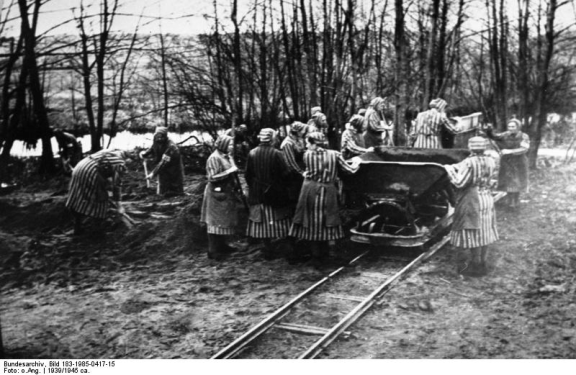1944 – Ravensbruck Concentration Camp – Germany: Prisoners No. 66729 and 66730, sisters Betsie and Corrie ten Boom, huddled under the dim light bulb in the back of Barracks No. 28 so they could read their worn Bible, which they had miraculously smuggled into the prison. After rising at 4:30 a.m. that morning, they had worked for 11 hours at a Siemens factory loading steel before returning to the barracks to find hope in the scriptures.
They were the daughters of Casper ten Boom, a jeweler and watchmaker in Haarlem, Holland. After his wife’s death from a brain hemorrhage, Casper raised four children in a two-story house located above his jewelry store. The ten Booms were devout Calvinists in the Dutch Reform Church.
In May 1940, after German military forces captured Holland, the ten Booms turned their house into a place of refuge for Jews trying to escape from the Nazis. The watch shop made for a nice façade to disguise what was happening in the rooms above.
Casper built a small secret room, a hiding place, behind a false wall in Corrie’s bedroom on the house’s top floor. The two-by-eight-foot space held six people. An alarm buzzer at the shop’s entrance alerted Jewish refugees to hide during German Gestapo security checks.
On February 28, 1944, after a neighbor informed the Gestapo of the ten Booms covert activity, the entire family was arrested, loaded on a rail car and shipped to Scheveningen Prison, 40 miles away. There they were separated, and unbeknownst to Betsie and Corrie, 84-year-old Casper died 10 days later. Miraculously, five months later, Betsie and Corrie were reunited at Ravensbruck, Germany’s notorious women’s death camp.
Barracks 28, built to accommodate 400 people, housed 1,400 women who shared eight toilets. Because there were no beds or blankets, the women slept side-by-side on soiled, flea-infested straw. Many women starved to death or died of disease. Others died in the gas chambers.
Each night before lights out, Betsie and Corrie read aloud from their Bible while other women crowded around them to listen and pray. Within a short time, two services were required to accommodate the women who pressed in to hear daily encouragement.
On this particular night, Betsie read from Thessalonians, “Rejoice always…Give thanks in all circumstances.” Corrie stared, wondering what there was to give thanks for in that God-forsaken place. Betsie reminded her to be thankful that they were together and for their ragged Bible. Then she hesitated, “And we give thanks for these swarms of fleas that infest the straw in the barracks.”
The flea infestation was so severe the prison guards refused to enter the building allowing Betsie and Corrie the opportunity to conduct their Bible studies. A bit indignant, Corrie quipped, “Betsie, there is no way that even God can make you grateful for fleas.” But they stood there and gave God thanks for the fleas.
It is estimated that 117,000 women died or were executed at Ravensbruck between 1939 and 1944. Betsie died there on December 16, 1944. Before she died, she admonished Corrie, “We must tell them what we learned here. After the war, we must travel the world telling them how good God is.” Just 10 days after Betsie died, Corrie, because of a clerical mistake, was released from Ravensbruck.
For more than 30 years after the war, Corrie ten Boom traveled the world telling the story of their prison experience and about the goodness of God. Her books The Hiding Place and Tramp for the Lord became international bestsellers. It is estimated that the ten Boom family saved 800 Jews from death in Holland. Corrie died on her 90th birthday, April 15, 1982.
“When a train goes through a tunnel and it gets dark, you don’t throw away the ticket and jump off. You sit still and trust the engineer. Every experience God gives us, every person He puts in our lives is the perfect preparation for a future that only He can see.” Corrie ten Boom

Very inspirational story. Thanks for sharing.
Thanks Roy!
I have read her books. I had forgotten about the “fleas” Both the sisters were amazing women.
Incredibly strong women!